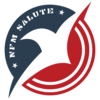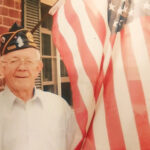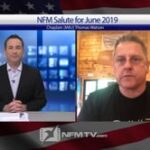NFM Lending is pleased to honor Staff Sergeant Giovanni Pierorazio as the NFM Salute for May 2019.
SSG Pierorazio was born in a small mountain village in central Italy. He and his family emigrated to the U.S. when he was ten years old. He graduated high school in June of 1967. SSG Pierorazio immediately enlisted in the U.S. Army and began his military service the following September, with basic training in Fort Benning, GA. He spent November and December in Advanced Infantry Training (AIT) at Fort Gordon, GA. In early February of 1968, he was assigned as a replacement to Company D, 2nd Battalion, 7th Cavalry, 1st Air Cavalry Division.
SSG Pierorazio shared a story from his time with this Company.
“On the 24th of March, my Company was sent out on an air assault against elements of the North Vietnamese Army, which just been forced out of the city of Hue by US Marines. These forces were trying to escape, and our units were intent on stopping them. Within a few hours, we came under fire from NVA forces and an increasingly intense battle ensued. During that battle I was wounded when rifle fire struck me in the left forearm.”
As a result of his wound, SSG Pierorazio was evacuated back to the US. He convalesced at Walter Reed Military Hospital until October. At that time, he was assigned to the 197th Light Infantry Brigade garrisoned at Fort Benning. In May of 1969, SSG Pierorazio was ordered to the Republic of South Korea, where he stayed for the remainder of his Army tour of duty; serving in the Demilitarized Zone between the two Koreas. SSG Pierorazio returned to the US at the end of June of 1970 and was discharged from active duty in Fort Lewis, WA on July 2nd, 1970, having attained the rank of Staff Sergeant, E-6.
SSG Pierorazio was the recipient of several service awards, including a Purple Heart and a Bronze Star.
SSG Pierorazio was nominated by his nephew, John Liberatore.
“I, along with the rest of my family, would like to let Giovanni know how proud we are of him for the sacrifice he gave in serving his country.”
SSG Pierorazio chose the Gary Sinise Foundation to receive this month’s donation. NFM looks forward to the opportunity to continue to honor military and Veterans through the NFM Salute initiative.
Full Transcript of Video Interview is Below:
– Welcome to our May NFM Salute. I am your host, Greg Sher. I am so honored to be joined in person here in our studio by Staff Sergeant Giovanni Pierorazio who served in Vietnam. Thank you for joining us, and thank you for your service.
– You’re welcome, thank you.
– You were 19 years old, you volunteered to serve in the military, you went to Vietnam. What went into that decision, and what was the experience like?
– Well to begin with there are a number of things I was thinking about at the time. Among them, in part, was the longing for adventure, to get away from home and to see the big world. And at the same time I wanted to serve because as an immigrant I felt very patriotic. And getting the opportunity to do so at a time when there was a war on against what many people considered to be this great evil, this great oppressor. It was a perfect kind of combination of things for me.
– Soon after you arrived you were wounded. Can you talk about that experience and what it led to?
– Yes, we were on a mission to try to block a unit of North Vietnamese Army that had been chased out of the city of Hue by the Marines who had recovered Hue by that point. When we air assaulted in and made contact, and within a few moments as our company went online to confront the enemy myself and my fire team found ourselves on the extreme left flank. Which meant that we posed an extreme threat to the enemy. As a result, the fighting really got heavy, and I was shot in the arm and taken out of action. Medics came, patched me up, before I knew it I crawled out, got on a helicopter, and I was repatriated to the United States.
– And so when you came home to the United States, let’s just call it a rude awakening. What was it like to come home and to have your own citizens who you were protecting shun you?
– Well that was quite a difficult situation to deal with. I think I speak for most veterans of that era, we all pretty much got the same kind of reception. It was totally unexpected. And it was difficult on a number of levels, particularly psychologically. And I would say that most of the veterans that, combat veterans, suffered to some degree from those kinds of symptoms. And they really didn’t get the kind of help they probably should have gotten.
– [Greg] Were you surprised that the welcome was not warm?
– It was a surprise because it seemed to be such a general response. I would have expected it from a few people, but it seemed like most folks thought negatively of us when most of us thought we had done something positive.
– Well ironically since then there’s been, there’s the Gulf War, there’s Desert Storm, and those troops have come home to a lot of fanfare. What’s been your observation in seeing that, and has it made you think about the way you were welcomed home?
– Well I remember immediately after Desert Storm and the troops marched in parades and were welcomed by cheering crowds. I was very, very happy to see that for the soldiers themselves, for those veterans. At the same time I couldn’t help but have a little bit of a twinge when I thought about the way that we had been welcomed or not welcomed on our way home.
– Well back then as many know there was a draft. You chose to volunteer. These days people volunteer, right? So there are many people out there that may be considering joining the military, or they have children considering joining the military. What would be your advice to them as someone who served?
– I think that the military is a great place for someone that’s searching especially to get themselves started. Even if you’re not searching, if you have a very specific career in mind, it’s a great place to start. The military has all kind of programs that are perfect for someone that already knows what they want to do. For instance, if you want to become a doctor, join the service and if you can qualify for the program, they’ll make you a doctor. On the other hand if you have somebody who’s not, who really doesn’t know what they want to do, is kind of wandering along looking for a sense of direction, two or three, four years they might spend in the military will give them the time to think about things, to think things over, and arrive at some sort of a plan for their future.
– So we really appreciate you again joining us. I’m gonna leave this for you. It’s a couple of trinkets from us here at NFM Lending commemorating the NFM Salute: a t-shirt and a bag and some other parting gifts. Of course we’ll make a donation in the charity of your choice, and we invite anyone that wants to see previous NFM Salutes or learn about the program or nominate somebody like Staff Sergeant Giovanni Pierorazio, you can always go to nfmsalute.com. Staff Sergeant thank you again very much for your service and for joining us on NFM TV.
– Thank you, it was my pleasure.
– Alright, we’ll see you next time. Thank you.


